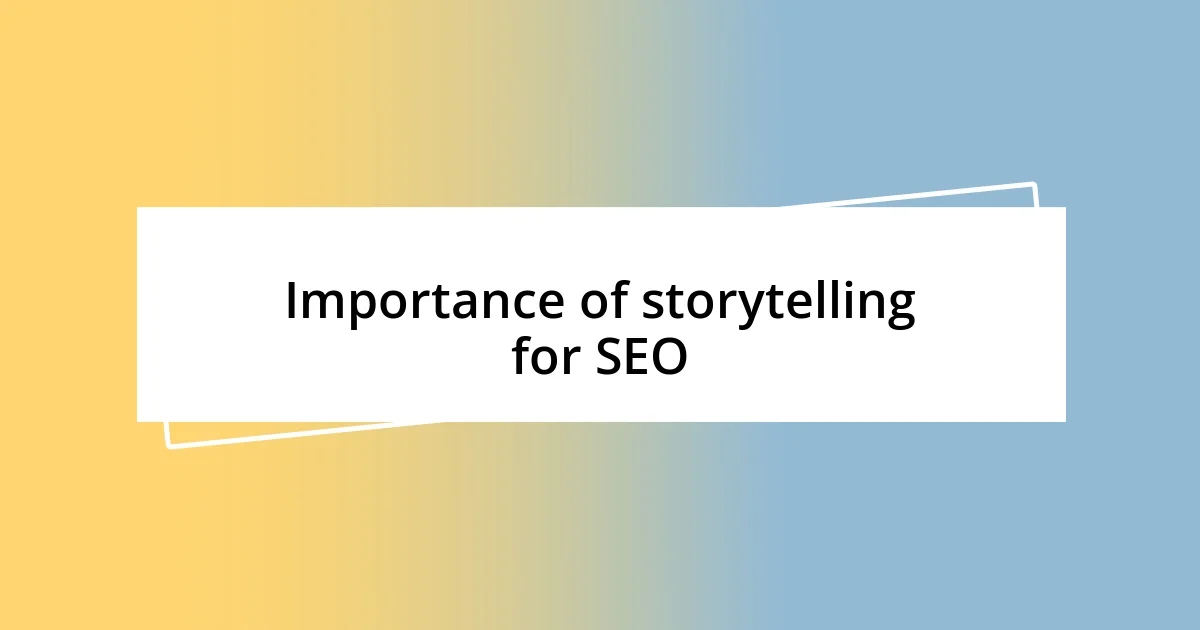Key takeaways:
- Storytelling in SEO enhances user engagement and creates emotional connections, making content more shareable and memorable.
- Key elements of effective storytelling include authenticity, structure, and emotional impact, which help maintain reader interest and foster deeper connections.
- Understanding the target audience’s desires and pain points allows for crafting relatable narratives that resonate and effectively convey complex topics in an engaging manner.

Understanding storytelling in SEO
Storytelling in SEO is more than just crafting engaging narratives; it’s about connecting with your audience on a deeper level. I remember reading a blog post that made me feel like the writer was speaking directly to me, sharing their struggles and triumphs. This connection is vital because it not only draws readers in but also encourages them to share your content with others, enhancing your site’s visibility.
When I think about SEO, I often reflect on how stories create a memorable experience. Take, for example, a brand that shares authentic customer testimonials. These real-life experiences resonate emotionally and tend to stick with us, making it easier to remember the brand later on. Isn’t it fascinating how a story can elevate a simple product into something much more relatable and valuable in the eyes of consumers?
Moreover, storytelling can complement keyword strategies by weaving them naturally into a narrative. I’ve seen how integrating keywords into a story instead of listing them in a dry manner not only improves SEO rankings but also enriches the reader’s experience. Think about it: would you rather read a list of keywords or be transported into a well-told tale that leaves you with the information you need? The latter not only captivates but also informs, making it a win-win for both search engines and users alike.

Importance of storytelling for SEO
Storytelling is crucial for SEO because it fosters engagement that traditional content often lacks. I can recall a time when I stumbled upon a technical article that, while informative, felt like a chore to get through. In stark contrast, another piece I found used narrative elements—personal anecdotes, relatable scenarios—which not only made the content enjoyable but also encouraged me to share it with my network. This emotional connection is integral. It’s this depth that search engines recognize and reward, ultimately helping your site climb the ranks.
Consider the various benefits storytelling brings to the SEO table:
- Enhanced User Engagement: A captivating narrative keeps readers on the page longer, reducing bounce rates.
- Stronger Emotional Connection: Stories resonate with readers, making them more likely to share and refer others.
- Increased Shareability: People are drawn to stories that evoke feelings, resulting in more shares on social media.
- Improved Keyword Integration: Incorporating keywords within a narrative feels natural, optimizing your content without sacrificing flow.
- Higher Ranking Potential: Engaging content attracts more backlinks and social shares, leading to improved rankings in search results.
These elements intertwine to create a holistic approach to SEO that transcends mere numbers, ultimately driving authentic interactions between brands and their audiences.

Key elements of effective storytelling
When I think about effective storytelling, the first element that stands out is authenticity. I remember a time when I wrote a blog post about my journey learning SEO. Sharing my struggles and triumphs made the content relatable and genuine. Readers often commented on how my honesty inspired them, proving that when we speak from the heart, it resonates on a deeper level.
Another key element is structure. A well-organized story guides the reader through the narrative seamlessly. I’ve noticed that when I weave a clear beginning, middle, and end into my storytelling, it helps the audience follow along and retain the information better. Have you ever listened to a story that felt all over the place? It’s easy to lose interest. But a structured approach captivates the reader and keeps them engaged.
Lastly, emotional impact is vital. I often incorporate personal emotions and reflections into my stories, as this approach connects with readers beyond just words. For instance, when discussing the importance of SEO, I share how the thrill of seeing my website traffic grow filled me with pride. This emotional punch not only makes my storytelling more vibrant but also encourages readers to reflect on their own experiences.
| Key Element | Description |
|---|---|
| Authenticity | Connecting with the audience through genuine experiences and emotions. |
| Structure | A clear beginning, middle, and end helps maintain reader engagement. |
| Emotional Impact | Incorporating personal emotions to create a deeper connection with the audience. |

Crafting narratives for target audiences
When crafting narratives for target audiences, I find it essential to deeply understand their desires and pain points. For instance, I once wrote a piece targeting small business owners grappling with online visibility. I included a story about a local shop owner who turned her fortunes around by embracing digital marketing. This narrative not only highlighted a relatable struggle but also showcased a solution, making the content both inspiring and actionable.
Every audience connects differently with stories. I often ask myself, “What makes them tick?” Recently, I shared my experience of trying to master SEO tools through a series of both humorous and frustrating mishaps. By detailing this journey, I tapped into the audience’s empathy and created a stronger bond. This emotional resonance is what positions your narrative to hit home and stick with readers long after they’ve left the page.
The tone of your narrative can also make a significant difference. When communicating complex topics, I prefer an informal yet informative style. Once, while explaining the concept of backlinks, I created a scenario of a young artist networking at events. This narrative lent a human touch to a technical aspect of SEO, making it not only digestible but also enjoyable for readers. If you think about how much you remember from engaging stories compared to dry facts, it’s clear: a well-crafted narrative transforms information into a memorable experience.














